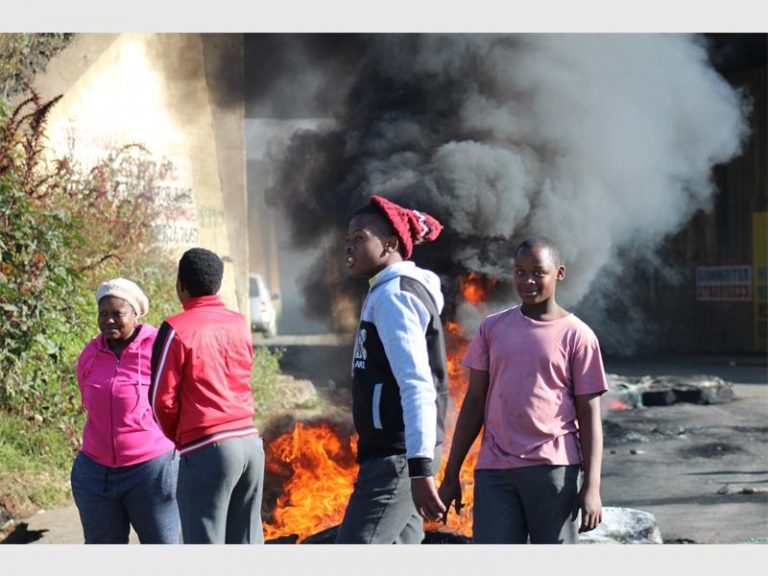19 May 2018
Shack Dwellers Movement Remains Defiant in Face of Police Assault
The occupation of unused land by members of the Abahlali baseMjondolo (shack dwellers movement) to provide housing for residents of the dilapidated Good Hope Settlement in Germiston, South Africa, met with police violence on multiple occasions this week. The police not only pulled down the shacks the movement had constructed but also used tear gas and rubber bullets to attack the residents in an attempt to ensure they did not return to occupy the land.
For years, thousands have lived in the rat-infested Good Hope Settlement, without proper toilets or electricity connections, crammed together in small shacks that are often flooded. Refusing to live in such dangerous conditions, the residents of this area met the MEC of Human Settlements for the Gauteng province last November, whereupon they were asked to identify land where better residential conditions could be arranged for, and were promised that his department would then discuss acquiring the land.
However, after officials from the Provincial Department of Human Settlements visited the land they had identified less than a kilometre away from the settlement and the geo-tech survey confirmed that the land was fit for housing, officials fell silent, and the ME refused to respond when contacted by Abahlali baseMjondolo.
In February this year, the Abahlali baseMjondolo of this region issued an ultimatum that if the officials continued to ignore them, their members residing in the Good Hope Settlement would occupy the land that is owned by the Witwatersrand Gold Mining Trust, which they claim had remained unused for 40 years.
Occupation begins
Finally, on the May 11 this year, 30 members of Abahlali baseMjondolo’s Good Hope branch moved in – with hammers, axes and measuring tapes – and began planning a layout for a new settlement. Apart from demarcating plots to build 500 shacks – each of which would house five to nine people – separate areas were allotted for a community hall, a creche, a school, a clinic and churches, with plans in place for laying interconnecting streets. The occupied land was named Zikode Extension, after the founder of the shack-dwellers movement, S’bu Zikode.
The sound of hammers ramming wood rang in the cold air throughout the night as about 150 members, most wrapped in blankets, worked in the light of burning tyres around which groups of people sang in a low voice. At the break of dawn, three houses were fully built, and by 11, seven more were ready, with the skeletal frames set up for many more.
Soon, police units arrived at the site with shotguns to demolish the “illegal” structures, and by past midday, none of shacks had remained. “Zinc sheets that were once walls were loaded onto a truck, while the wooden frames of the shacks were thrown on to three bonfires,” according to a report. Abahlali baseMjondolo claimed in a press release that the police “also threw some children’s school bags containing food and phones into the fires.”
“After our shacks were destroyed by the police, we decided to continue to resist by rebuilding. All the occupiers have given R10 each so that that we can buy more materials and build one structure that we will all sleep in tonight. If the police continue to demolish, we will continue to rebuild,” the organization announced, and persisted with the occupation.
The police did not relent either. Returning the next day, police forces destroyed the large hall that was built after initial demolition to provide shelter for those who were working to build the shacks.
Abahlali baseMjondolo released another press statement, noting that their struggle for land had been reduced to criminality. “We are not invaders, land grabbers or anarchists. We occupy land for our survival. We occupy land for living,” the statement said.
“For too long”, the statement added, “black people have been denied access to land by the colonial system. We were further deprived of the right to the cities by the apartheid system. We have been patient for long enough. We have waited for the ANC led government to give us access to land and to democratise the cities since 1994. Now it is the time for us to occupy this land and to take our place in this city.”
In the face of police violence
On May 16, the police stepped up their offensive. After demolishing more structures the members had built and forcing them out of the land, armed police were deployed as a buffer between the Good Hope settlement and the land its residents had occupied.
After negotiations with police officers to allow the residents to move back to the land failed, some of the members of Abahlali baseMjondolo tried to make their way across the cordon. The police immediately responded by firing rubber bullets and tear gas.
“The air was thick with the asphyxiating smell of tear gas. Officers appeared to shoot indiscriminately at anyone within range”, New Frame reported, adding that the reporter “saw one officer hurling bricks at people and showing other officers where people were hiding so they could shoot in their direction.” One of the members has been arrested and some injured.
Unrelenting in face of police violence, the members put up burning tyres to blockade the two roads flanking the settlement, leaving them inaccessible to traffic the whole of yesterday.
Eventually, the City of Ekurhuleni’s MMC of Human Settlements, Lesiba Mpya, arrived at the scene, and after negotiations, has given a written assurance to the residents that a meeting will be held at his office on May 21, whereupon the process will be initiated to investigate the suitability of the land for housing the residents.

